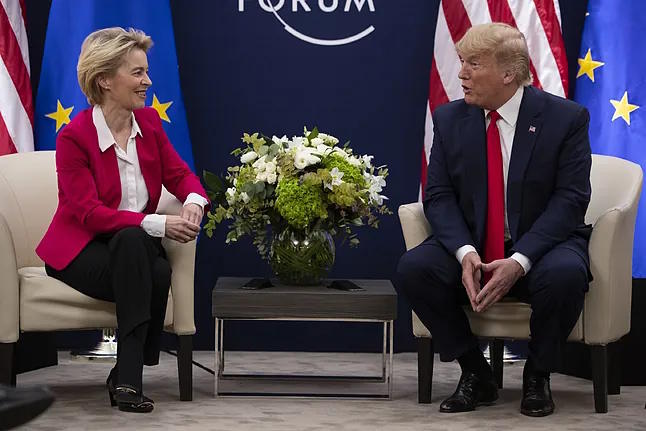The European Union has identified five major points in the trade war initiated by Donald Trump, which is already being referred to in Brussels as the 'Big Five', and in which the President of the United States has a special interest: the automotive sector, pharmaceuticals, metals such as steel or aluminum, wood, and semiconductors.
In fact, tariffs have already been implemented on steel and aluminum, and in the automotive sector, Trump has announced a 25% tariff on all vehicles manufactured outside the EU. However, Brussels also emphasizes the importance of the other three sectors and sees a similarity among the five: that the magnate wants to strongly boost the American industry within these areas.
Due to their technological and innovative importance, such as in the case of semiconductors or the pharmaceutical sector, by tradition and national pride, which could apply to the automotive industry or even to the metals sector, or because it is directly a very important area in fundamental states for the Republican Party. This is the case with the wood sector, which has a long tradition, for example, in Georgia. In fact, the Commission has already stated that it will also target that product with its "smart tariffs" to inflict damage "where it hurts the most". In the heart of republicanism.
Brussels, even with this premise clear, maintains that the ideal scenario is to negotiate. In fact, during the visit led this week by the Commissioner for Trade, Maros Sefcovic, the US and EU delegations met for six hours. However, the outcome was practically null given the United States' position; they are very aware that Trump has little interest in containing the trade war, and in Brussels, they estimate that the situation is particularly complicated in the automotive and pharmaceutical sectors. In the rest of the areas, the chances of reaching agreements are very slim, but in these two, the situation is almost impossible.
The EU is equally aware of Trump's constant changes in positions, threats, and measures. They are clear that the magnate wants to accelerate many of his tariff measures to then begin a process of tax reduction. That is the policy in which he feels comfortable and which appeals to his voters, even if it leads the United States to a recession or lower economic growth along the way.
Therefore, the European Commission is "calibrating" the response to the trade war, which will intensify starting on April 2. That day, which Trump has dubbed as the "liberation" day, many of the so-called "reciprocal" measures will come into effect, and notably absent from these will be actions in the automotive, pharmaceutical, or semiconductor sectors. That will come later if an unlikely agreement is not reached. For now, Brussels is preparing a response worth 26 billion euros, which will come into effect in mid-April, and to which the response to any additional measures announced by Trump will need to be added.
At the same time, Brussels is already working on forming new trade ties, with India, for example, and refocusing its relationship with China. For the latter, Sefcovic traveled to Beijing immediately after the unsuccessful talks with Washington. "We must ensure that the relationship between the European Union and China is based on equal conditions, both in terms of trade flows and investments, with a symmetrical market opening," he stated on his X social media profile after meeting with the Chinese Trade Minister, Wang Wentao.
Details of the meeting are scarce, beyond the fact that there was a "significant exchange" on how to steer the bilateral relationship "in this new direction." During the same trip, Sefcovic also met with Chinese Vice Premier He Lifeng, who, as indicated by the Commission, conveyed that China is willing to "strengthen dialogue and exchange" between both parties and "resist unilateralism and protectionism."
China is viewed with clear suspicion in Brussels; it is not considered the best possible partner, and there are accusations of illegal competition in sectors such as electric cars or steel and aluminum. However, Trump's return to the White House has significantly shaken up trade relations, and Europe is trying to find its place to not fall behind. Even more so.
